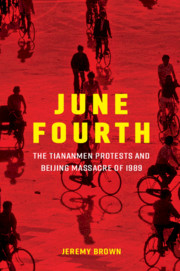26 results
Chapter 16 - (In)Visible Beijing Within and Without World Literature
- from Part II - Spotlight Literary Cities
-
-
- Book:
- The Cambridge Companion to the City in World Literature
- Published online:
- 13 July 2023
- Print publication:
- 27 July 2023, pp 248-263
-
- Chapter
- Export citation
4 - Linking the Local, National, and International
-
- Book:
- China's Cold War Science Diplomacy
- Published online:
- 18 August 2022
- Print publication:
- 25 August 2022, pp 133-169
-
- Chapter
- Export citation
9 - Banking on the Belt and Road
-
- Book:
- Banking on Beijing
- Published online:
- 21 April 2022
- Print publication:
- 05 May 2022, pp 282-302
-
- Chapter
- Export citation
“Patchy Patriarchy” and the Shifting Fortunes of the CCP's Promise of Gender Equality since 1921
-
- Journal:
- The China Quarterly / Volume 248 / Issue S1 / November 2021
- Published online by Cambridge University Press:
- 11 August 2021, pp. 95-115
- Print publication:
- November 2021
-
- Article
-
- You have access
- Open access
- HTML
- Export citation
17 - Massacre
- from Part Three - Massacre
-
- Book:
- June Fourth
- Published online:
- 01 April 2021
- Print publication:
- 01 April 2021, pp 140-152
-
- Chapter
- Export citation
9 - The Beijing Massacre as History
- from Part Three - Massacre
-
- Book:
- June Fourth
- Published online:
- 01 April 2021
- Print publication:
- 01 April 2021, pp 101-103
-
- Chapter
- Export citation
12 - Where Bullets Flew
- from Part Three - Massacre
-
- Book:
- June Fourth
- Published online:
- 01 April 2021
- Print publication:
- 01 April 2021, pp 112-116
-
- Chapter
- Export citation
16 - Quiet Reckonings
- from Part Three - Massacre
-
- Book:
- June Fourth
- Published online:
- 01 April 2021
- Print publication:
- 01 April 2021, pp 135-139
-
- Chapter
- Export citation
19 - Outside In
- from Part Four - Nationwide
-
- Book:
- June Fourth
- Published online:
- 01 April 2021
- Print publication:
- 01 April 2021, pp 168-176
-
- Chapter
- Export citation
15 - The Massacre Continues
- from Part Three - Massacre
-
- Book:
- June Fourth
- Published online:
- 01 April 2021
- Print publication:
- 01 April 2021, pp 131-134
-
- Chapter
- Export citation
25 - “Rioters”
- from Part Five - The Aftermath
-
- Book:
- June Fourth
- Published online:
- 01 April 2021
- Print publication:
- 01 April 2021, pp 213-216
-
- Chapter
- Export citation
10 - Authorized Force
- from Part Three - Massacre
-
- Book:
- June Fourth
- Published online:
- 01 April 2021
- Print publication:
- 01 April 2021, pp 104-107
-
- Chapter
- Export citation

June Fourth
- The Tiananmen Protests and Beijing Massacre of 1989
-
- Published online:
- 01 April 2021
- Print publication:
- 01 April 2021
13 - Inside the Square
- from Part Three - Massacre
-
- Book:
- June Fourth
- Published online:
- 01 April 2021
- Print publication:
- 01 April 2021, pp 117-121
-
- Chapter
- Export citation
11 - Permission to Open Fire
- from Part Three - Massacre
-
- Book:
- June Fourth
- Published online:
- 01 April 2021
- Print publication:
- 01 April 2021, pp 108-111
-
- Chapter
- Export citation
14 - Victims
- from Part Three - Massacre
-
- Book:
- June Fourth
- Published online:
- 01 April 2021
- Print publication:
- 01 April 2021, pp 122-130
-
- Chapter
- Export citation
2 - More Structure, More Deference
- from Part I - Structured Proportionality
-
-
- Book:
- Proportionality in Asia
- Published online:
- 18 September 2020
- Print publication:
- 27 August 2020, pp 25-59
-
- Chapter
- Export citation
6 - The “Floating Population” and “New Migrants,” 1980s to the Present
-
- Book:
- Chinese Diasporas
- Published online:
- 31 January 2020
- Print publication:
- 20 February 2020, pp 196-227
-
- Chapter
- Export citation
1 - March to Power in a Chinggisid World
-
- Book:
- Ming China and its Allies
- Published online:
- 10 December 2019
- Print publication:
- 02 January 2020, pp 19-57
-
- Chapter
-
- You have access
- HTML
- Export citation
Acquiring a Beijing hukou: Who Is Eligible and Who Is Successful?
-
- Journal:
- The China Quarterly / Volume 243 / September 2020
- Published online by Cambridge University Press:
- 09 December 2019, pp. 855-868
- Print publication:
- September 2020
-
- Article
- Export citation



